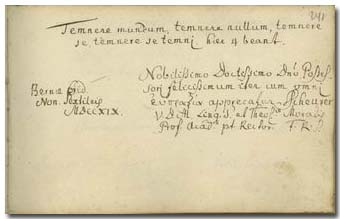
Temnere mundum, temnere nullum, temnere se, temnere se temni. haec
4 beant.
Nobilissimo Doctissimo D[omi]no Possessori

S. Scheurer V[erbi] D[ivini] M[inister] Ling[uae] S[acrae] et Theol[ogi]ae Moralis Prof[essor]
Acad[emi]ae p[ro] t[empore] Rector. F[ellow of the] R[oyal] S[ociety]
Bernae, prid[ie] Non[ae] Sextileis MDCCXIX.
|
|
Fearing the world, not fearing anything, fearing yourself, fearing
from making others fear – happiness consists in these four things.
I wish a happy journey full of successes to the
noble and learned owner [of this book]
S. Scheurer pastor, professor of Hebrew and moral theology, and at
this time rector of the academy, and fellow of the Royal Society.
In Bern, on the day before Nonae of August of
1719
|
p. 241. Bern, August 4, 1719
Scheurer, Samuel
(?-1747), Swiss theologian,
Hebraist
Samuel Scheurer was a pastor in Bern, and besides the professor of
Hebrew, of catechetic theology, and from 1735 of elenchtic
theology. (Catechetic theology – theologia catechetica – is
the discipline of practical theology considering the instruction
of religion and education to Christian life. The elenchetica
is a method of argumentation, which refutes the opposing arguments
by showing up their bias, erroneous conclusions and inner
antagonisms.) Finally he was appointed first professor of
theology. He was a member of the Prussian and English Scientific
Societies. He died in Bern on September 18, 1747. His works: Bernerisches Mausoleum
oder … berühmten und sonderlich um die Kirchen Gottes in diesem
Land hochverdienten Männeren … aufgerichtetes Ehren-Maal in
ihrer kurtzen Lebens-beschreibung … Bern, 1740. (Athenaeum
Bernense). – Kurtz gefasste Natur und schrifftmässige
Theologie.
Besides his academic and pastor's offices (V.D.M. = verbi Divini minister,
that is, servant of the divine word), Samuel Scheurer also
indicates his membership of the Royal Society of London (F.R.S. = fellow
of the Royal Society). In the date he uses the ancient name
"Sextilis" for August. In the album we find another ancient name,
"Septilis" for September, in the note of Gundling (p.
151).
•
Jöcher |

